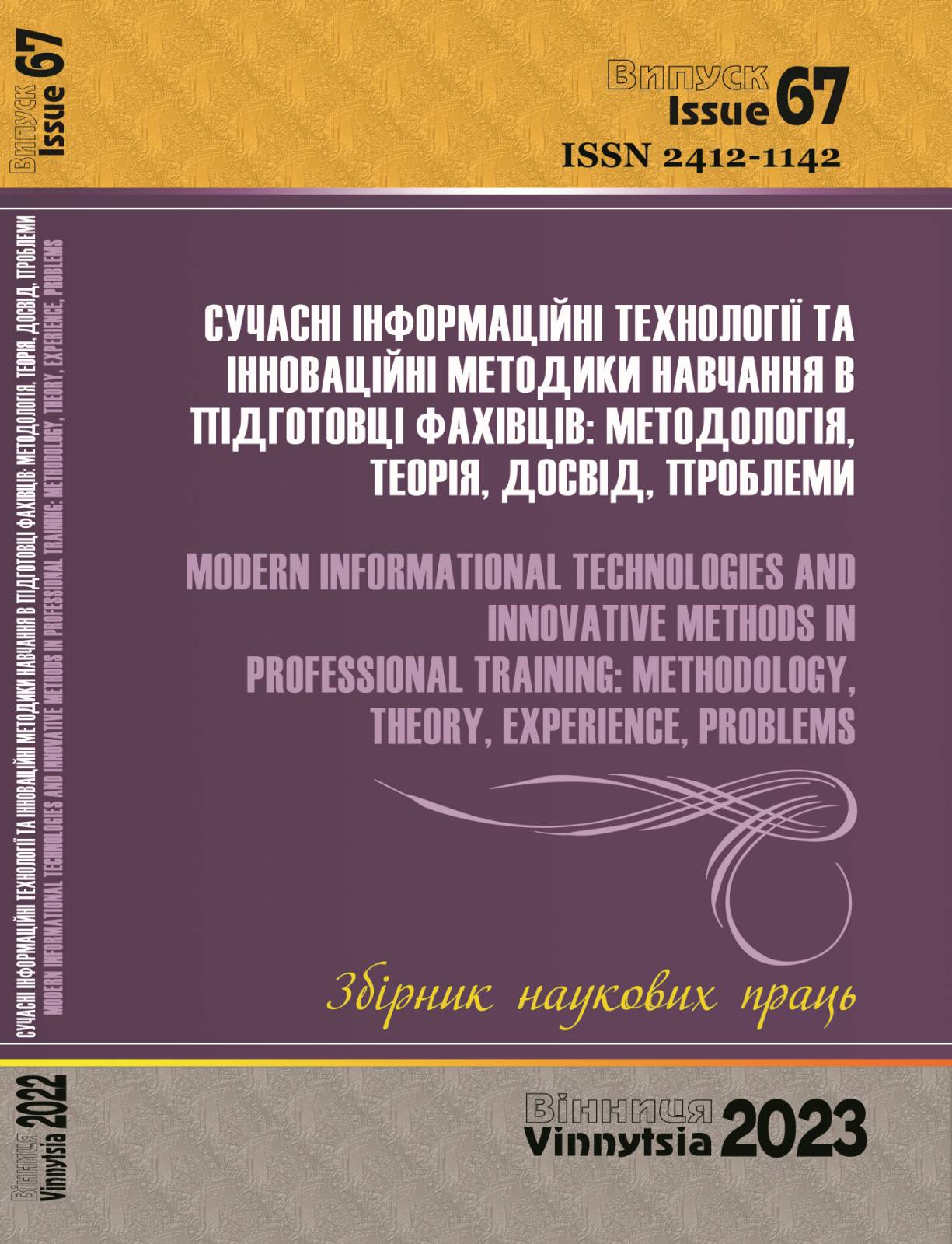LEADING TENDENCIES AND FEATURES OF THE INTEGRATION OF EDUCATIONAL AND SCIENTIFIC ACTIVITIES IN INSTITUTIONS OF HIGHER EDUCATION
DOI:
https://doi.org/10.31652/2412-1142-2023-67-120-129Keywords:
higher education institution, scientific activity, educational activity, integration, leading trends, peculiaritiesAbstract
The article examines the peculiarities and leading trends of the functioning and development of
scientific activity of institutions of higher education as a multi-component system in the modern educational
and scientific space. The prerequisites for the functioning of the system are determined (formation of the
scientific space; identification of the system parameters with the aim of including them in the relevant models;
description of the properties of the system functioning environment; provision of the scientist with conditions
for work; the ability of the scientist to perform this type of work; analysis of the internal and external
parameters of the system in their interaction, etc.) . Based on the analysis of the essence of scientific activity,
its features in institutions of higher education were revealed: direct participation of teaching staff in research
work; mutual influence of scientific and educational processes; the unity of branch and pedagogical knowledge
of a modern scientific and pedagogical worker; ensuring connections between research work and the
educational process; organization of joint research work of teachers and students; advisory assistance of the
teacher in research work of students; organization of scientific and methodical seminars, research and other
types of works of the participants of the educational process. For a scientist, the subject of work is the process
of transformation and, first of all, the acquisition of new knowledge with the prospect of its further application.
Relatively invariant are the means of scientific and pedagogical work, which have a number of common
characteristics for all institutions of higher education. However, it is possible to determine the means of
scientific and branch work by single-specialty educational institutions. Professional duties are reflected in the
job description and indicate the main forms of activity of a scientific and pedagogical worker as mandatory
components of the content of his professional activity. The leading trends in the development of the scientific
activity of the higher educational institution are summarized: the revival of the activity of scientific societies
with the aim of solving scientific, educational, branch and pedagogical problems of the higher school;
deepening the training of qualified specialists and highly qualified scientific and pedagogical staff at higher
education institutions; establishment of ties between the teaching staff of the higher educational institution and
public organizations, cultural and educational institutions, business structures, etc.; organizing a comprehensive
discussion of the results of scientific research; priority development of fundamental research; expansion of
international cooperation, as well as cooperation with branch academies of sciences and other scientific
institutions.
Downloads
References
Болонський процес у фактах і документах. — К.; Тернопіль : ТДПУ ім. В. Гнатюка, 2003. 52c.
Рижко Л. В. Науковий простір: проблеми формування та трансформації (філософсько-праксеологічний аспект): дис. ... доктора філос. наук : 09.00.09. К., 2006. – 456с
Лігоцький А. О. Теоретичні основи проектування сучасних освітніх систем. К.: Техніка, 1997. 210 с , с. 88
Національна стратегія розвитку освіти в Україні на 2012 – 2021 роки Електронний ресурс.. – Режим
доступу: http://guonkh.gov.ua/content/documents/16/1517/Attaches/4455.pdf
Дробноход М. І. Наукова сфера України в контексті реформування.Освіта і управління. 2007. — № 1. – С. 8–17
Івашкова Т. Основні тенденції інтеграційних процесів у сучасному освітньому просторі. Збірник
наукових праць Національної академії Державної прикордонної служби України Серія: педагогічні
науки. 2016. №2(4). URL: http://nbuv.gov.ua/jpdf/znpnadpcpn_2016_2_10.pdf (дата звернення 20.09.2020)
Пушкарьова Т. О., Топузов О. М. Інтегративно-діяльнісна педагогіка : монографія. Київ : Пед. думка,
304 с.
Степанюк А. В., Степанюк Т. О. Інтеграційно-системний підхід як основа проєктування підготовки
магістрів спеціальності середня освіта (Природничі науки). Підготовка майбутніх учителів фізики хімії
біології та природничих наук в контексті вимог Нової української школи : зб. тез доп. ІІ Міжнар. наук.-
практ. конф. (м. Тернопіль, 20—21 трав. 2019 р.). Тернопіль, 2019. С. 210—214.
Даналакій О.Г. Інтегроване навчання природничо-математичних дисциплін у вищих навчальних
закладах. Молодий вчений. Сер. «Педагогічні науки». – 2017. – № 2 (42). – С. 475–478.
Прошкін В.В. Інтеграція науково-дослідної і навчальної роботи в університетській підготовці майбутніх
учителів як сучасна педагогічна проблема. Педагогіка вищої та середньої школи. – 2013. – № 37.
С. 374–379.
Downloads
Published
Issue
Section
License
Copyright (c) 2023 Козяр Михайло Миколайович , Савка Ірина Володимирівна, Козловський Юрій Михайлович

This work is licensed under a Creative Commons Attribution 4.0 International License.

